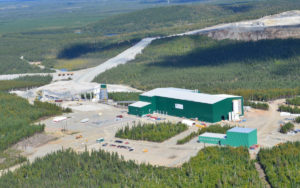The northern Quebec mine has been shuttered since 2019, but surging demand for lithium from the electric vehicle battery industry and the urgency to establish a North American supply chain is giving the site new purpose

Sayona Quebec, a joint venture between Australian lithium producer Sayona Mining and U.S.-based Piedmont Lithium, is set to restart operations at its North American Lithium (NAL) project in La Corne, Que. Photo: Sayona Quebec
The North American Lithium project in Quebec has been shuttered since 2019 after its previous owners ran out of money. But surging demand for lithium from the electric vehicle battery industry and the urgency to establish a North American supply chain is giving the site a new purpose
Sayona Quebec, a joint venture between Australian lithium producer Sayona Mining and U.S.-based Piedmont Lithium, is set to restart operations at its North American Lithium (NAL) project in La Corne, Que.
The project is anticipated to be North America’s first local supply of the critical battery material and Sayona Mining and Piedmont will invest an estimated $98 million to reopen and upgrade the open-pit spodumene (lithium) mine and concentrator at the site.
“We are delighted to put the seal on our plan to launch North America’s first local spodumene concentrate production, amid growing demand from both Canada and the United States for local and sustainable sources of this key battery metal,” said Sayona managing director Brett Lynch.
The North American Lithium site, located in the Abitibi regional county municipality about six hours northwest of Montreal, has been out of operation since 2019 when its previous owners, North American Lithium Inc., sought bankruptcy protection. NAL and the neighbouring Authier site were bought in a $46.7-million deal in August 2021 by Sayona Quebec.
The terms of the joint venture show Sayona Mining currently holds 75 per cent interest in Sayona Quebec and all its lithium projects, while Piedmont owns the remaining 25 per cent in Sayona Quebec and equity interest of 16.5 per cent in Sayona Mining.
NAL’s first spodumene production is expected for Q1 of 2023. That would make NAL the first local supplier of lithium concentrates in North America, but that’s not the ultimate goal for Sayona.
A lithium mining hub in Quebec
“Sayona’s acquisition of NAL and turnaround plan was not based simply on restarting the existing operation,” explained Lynch in a press release. “Rather, it was based on our strategy of creating an Abitibi lithium hub, drawing upon the operation of our nearby Authier project and investing in plant upgrades to deliver improved profitability and performance.”
Lynch anticipates that NAL will be the first of many developments in the region that will act as a catalyst for an economic and technological explosion in Quebec, including three other prospective sites Sayona Quebec owns in the area. Those are: Authier Lithium, another hard rock spodumene lithium deposit just 30 km from the NAL, Tansim, an open-pit lithium mine, 80 km southwest of Authier, as well as the Moblan Lithium Project farther north in the James Bay area.
“Combined with our emerging northern lithium hub, NAL will ensure Quebec is at the centre of lithium carbonate and/or hydroxide production in North America, becoming the axis on which a successful battery ecosystem can be built,” he says.
As part of its plans for creating a lithium mining hub, Sayona Quebec is looking to facilitate downstream processing and create further value in the growing electric vehicles and battery sector.
Since taking over NAL, Sayona Mining says it has hired key personnel, ordered critical long-lead equipment items, advanced detailed engineering design work and secured almost all of the necessary regulatory approvals.
Sayona Quebec is planning for NAL to become the primary feed source for its integrated downstream refined lithium products.
Promising feasibility reports
Prior to the restart announcement, Sayona Quebec conducted a pre-feasibility study for NAL to determine the technical and financial viability of the site. The study, completed in May, found that the NAL operation including Authier, could produce 1.5 million tonnes of ore annually, delivering 4.4 million tonnes of spodumene concentrate over an extended mine life of 27 years.
The study also identified efficiency and process improvements within the spodumene concentrator at NAL. New equipment in the crushing plant, additional crushed ore storage, expanded ore sorting, iron removal processing equipment, upgrades to the flotation circuit and product dewatering processes are just a few examples of infrastructure upgrades that will be needed.
The pre-feasibility study will form the basis of a definitive feasibility study, scheduled for the latter half of 2022, that will evaluate the economics of a larger integrated NAL and Authier resource base and operation.
A feasibility study commissioned by Sayona Mining for the Authier lithium project found it had the “potential to become a sustainable and profitable new mine,” reads a press release.
That study found that over a mine life of 13.8 years, the average annual output of spodumene would be 114,116 tonnes. Authier is still waiting on regulatory approvals.
A study completed for the Tansim project in 2021 by Sayona Mining also confirmed its “high exploration potential for lithium pegmatites,” but no other studies have been commissioned to determine the site’s resource estimate.
Sayona Quebec is now doing exploratory drilling at both its Tansim and Moblan sites.






